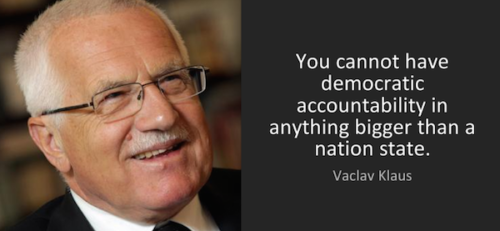is the former leader of the Czech Republic, and he remains an opinionated fellow about political matters. In particular, he appreciates the nation state as the right size of government to have.
He recently discussed the topic of migration with his typical skepticism.
Václav Klaus discusses mass migration, Catallaxy Files, March 28, 2018Grégoire Canlorbe: People are often defined by a common worldview rather than by genetics or where they live. In view of the situation in the Czech Republic, do you agree?
Václav Klaus: I would return the issue to the defense of the Nation-State. I truly believe in the Nation-State, therefore I am so critical of the continental ambitions of many European officials. I do not believe in the European Union or the European integration. This is for me the starting point.
For me, the Nation-State is the only possible way to have democracy. Democracy simply cannot exist at a higher level, as in continents, let alone global democracy in the world. So, my starting point is the Nation-State, the defense of the Nation-State, and the fighting continental integration.
In this respect, I am in favor of Trump. Donald Trump is not my cup of tea personally, intellectually, but his position on many issues is a positive one. I especially think of his refusal to sign the Paris Agreement, his important speeches like that in Warsaw in the summer or that in the United Nations in September, defending the Nation-States, culture, traditions, habits, mores and behaviors, lifestyles. It is something that I feel is with Trump, something that Hillary Clinton would never, never say.
Canlorbe: It is sometimes argued that mass immigration in the West is slowly changing class struggle into race struggle, substituting race consciousness for class consciousness. In addition, the dominant form of the class struggle would not be anymore that between “labor and capital” within each nation, but that between the “cosmopolitan” elites of the EU and the European peoples.[1] Your thoughts?
Klaus: For me, the “race struggle” is not the issue, and especially the “class struggle” is a term non-existent in my thinking. We were educated in terms of discussing the class struggle, because our teaching was based on the Marxist political economy. We finally understood how wrong the whole ideology is. I believe that after the fall of communism, I never used the word “class.” Maybe it is an overstatement, but the term “class” is for me intellectually forbidden and non-existent. For the same reason, I would never speak of the “race struggle.”
I am, however, absolutely critical of the mass migration in Europe. It is clearly not a spontaneous process. It is something which is organized by the European Union’s political elites. If you have read my book Migration of Peoples (not yet translated into English), you will probably have realized that I stress a distinction between mass migration and individual migration. Mass migration creates cultural, social and political conflicts, shocks and tensions. It undermines the structure of society that has been gradually developed over centuries, maybe even millennia.
Individual migration is evidence of considerable individual courage and of a certain taste for adventure. Usually, it is an act prepared in the long term and the product of an individual or family will. It means, for an individual, that he would like to get out of a cultural, civilizational, religious, geographical, or climatic entity with the full consciousness of a migrant who leaves for another world, an environment that will be foreign to him, to which he will have to adapt, and in which he will have to integrate and evolve.
Mass migration is a totally different phenomenon. The gregarious nature of mass migration makes decision making much less important than it is during individual migration. Mass migration remains a risky act, but mass migration increases the courage in an individual that is necessary for any migration. Mass migration also has the effect of changing the objectives of migrants. The goal is no longer to be assimilated into the new world, but to strengthen one’s old way of life.
What is new with mass migration, is the willingness of migrants to benefit only from the advantages available to them. Also at work often is the will to extend one’s home world to one’s host country and to transform it gradually according to one’s own tradition. Such a transformation is not the primary intention of every migrant. But this intention encourages political or religious activists.
The mass migration that we are witnessing today in Europe does not involve the individual, but the crowd, the collective, the group. Mercy towards the migrant’s individual suffering makes sense only with individual migration. Crowd, mass behavior does not deserve the same consideration. Though, I should remind that I am not fighting the migrants. I am fighting the European political elites, starting with Jean-Claude Juncker and Angela Merkel. Those are my opponents, my enemies.
(Continues)














